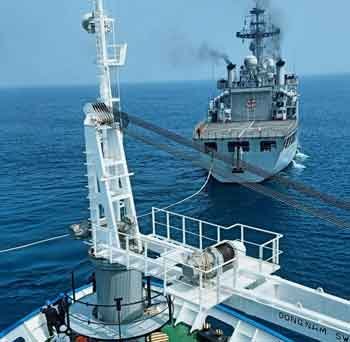Gujarat, October 22, 2025 — India’s armed forces conducted Exercise Trishul 2025, a large-scale tri-service drill involving the Army, Navy, and Air Force, in the marshy coastal terrain of the Sir Creek sector in Gujarat. The exercise aimed to demonstrate integrated operations, rapid deployment, and readiness to counter complex security challenges along the western border and coastal regions.
“Exercise Trishul is a testament to the synergy between India’s armed forces. It enhances our operational preparedness and ensures seamless coordination in real-world scenarios,” said Chief of Defence Staff General Anil Chauhan.
⚙️ Scope of Exercise
The exercise included:
Army Operations
Amphibious maneuvers in marshland terrain
Coastal defense simulations against potential incursions
Coordination with local intelligence units for real-time threat assessment
Navy Operations
Coastal surveillance and interdiction drills
Deployment of fast attack craft and maritime reconnaissance units
Protection of offshore assets and trade routes
Air Force Operations
Precision air support for ground troops
Rapid deployment of fighter and reconnaissance aircraft
Air-to-ground coordinated drills to secure strategic coastal zones
“The integration of air, sea, and land capabilities ensures that India’s western coast is fully protected against emerging threats,” explained Vice Admiral Ajay Singh, Western Naval Command.
🌍 Strategic Significance
Exercise Trishul is conducted annually to:
Strengthen tri-service interoperability
Enhance rapid response capabilities in marshy and coastal terrains
Test joint operational doctrines in a simulated conflict scenario
Demonstrate deterrence to regional adversaries
“The Sir Creek sector is strategically vital due to its proximity to international maritime boundaries. Trishul 2025 underscores India’s preparedness and vigilance,” said Major General R.K. Meena, overseeing the Army component of the drill.
Analysts note that joint drills like Exercise Trishul are essential for India to adapt to modern hybrid warfare, combining conventional, cyber, and asymmetric threats.
📊 Key Highlights & Observations
Troop Strength: Over 5,000 personnel participated
Equipment: Amphibious vehicles, naval craft, fighter jets, and UAVs deployed
Duration: Three-day drill culminating in a full-scale coastal defense simulation
Coordination: Seamless communication between Army, Navy, and Air Force units
“The drills showcased precise timing, coordination, and operational efficiency,” said Air Marshal Vikram Singh, Air Force commander overseeing air operations.
The exercise also included real-time threat simulations, challenging troops to respond to simultaneous land and maritime incursions.
💬 Official Statements & Public Messaging
Officials highlighted the importance of public awareness:
“Exercises like Trishul are vital not just for defense readiness but also for signaling India’s commitment to peace and stability in the region,” said Defence Ministry spokesperson Lt. Col. Arvind Kumar.
The drill also emphasized environmentally responsible military operations, ensuring minimal impact on coastal ecosystems and local communities.
🔮 Looking Ahead
The lessons learned from Exercise Trishul 2025 will inform:
Future tri-service joint operations
Development of new amphibious and coastal defense strategies
Enhancements in rapid deployment and crisis management protocols
Strengthening India’s deterrence posture along the western coastline
“Exercise Trishul 2025 demonstrates that India is not only prepared to defend its territory but also capable of integrating advanced technology and strategic planning across all three services,” said Defence Analyst Brigadier (Retd.) Anup Singh.
Conclusion:
Exercise Trishul 2025 showcases India’s military strength, coordination, and strategic readiness in a crucial coastal sector. By combining Army, Navy, and Air Force capabilities, the drill reinforces India’s ability to respond to multi-domain threats, safeguard its maritime borders, and maintain regional stability.















